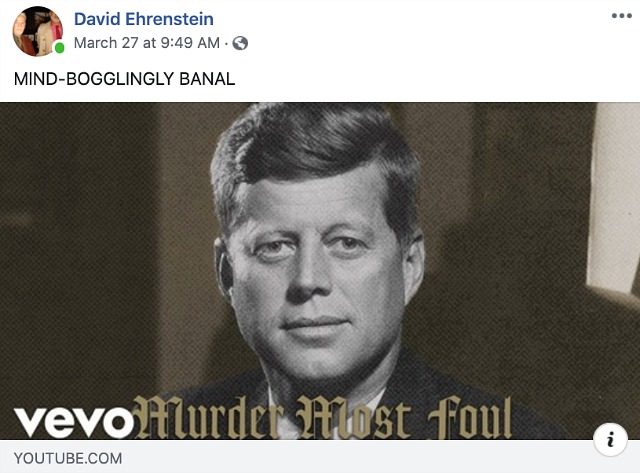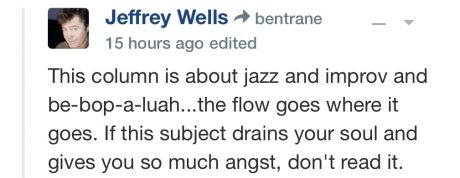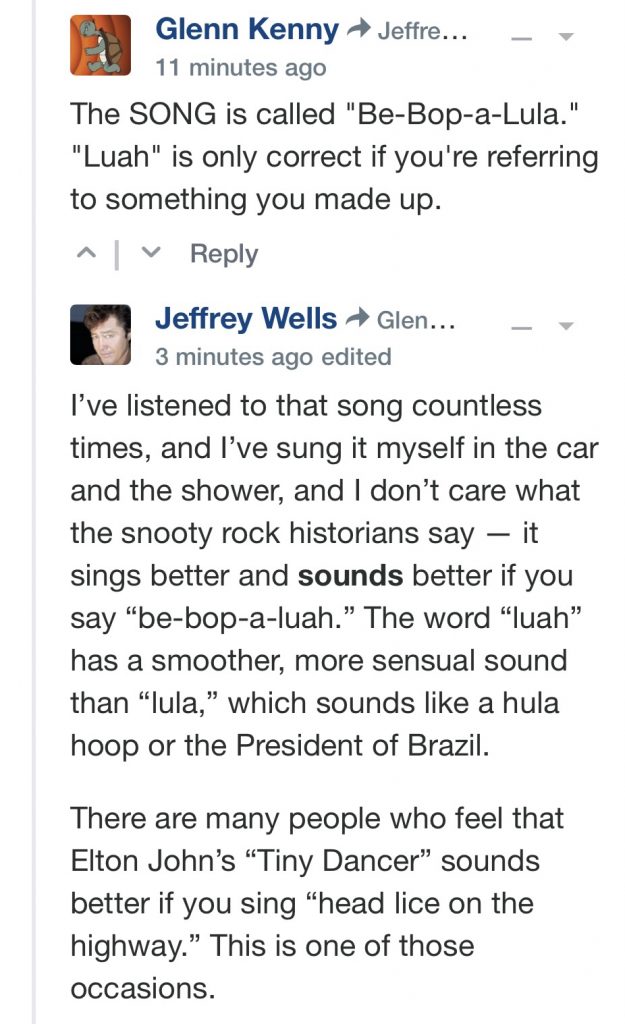I’ve misheard song lyrics all my life, and over time those wrong lyrics have sunk into my system and become frozen in amber, and now I can’t hear the correct lyrics to save my life. Most of the mis-heard lyrics were absorbed when I was a kid or a teenager, for the most part. I know it sounds silly but these idiotic re-wordings have stayed in my head.
Example #1: “All Shook Up,” Elvis Presley. All my life I’ve been hearing “I’m itchin’ like a man on a buzzin’ tree” and “mah friends say I’m actin’ wide as a bug.” The correct lyrics are “I’m itching like a man on a fuzzy tree” and “my friends say I’m actin wild as a bug.” Except Presley doesn’t say “wild” in that song. Wild is a two-syllable word that Presley just flat-out doesn’t pronounce — he says “wide.” Yes, an idiotic interpretation. How exactly does a bug act when he’s “wide”? (Or “narrow” for that matter?) But there’s nothing crazy about itching as a result of being in the vicinity of a “buzzing” tree. The tree could be buzzing with mosquitoes or flies or gnats and you could feel itchy from that proximity.
Example #2: “(The Love I Saw In You Was) Just A Mirage,” Smokey Robinson & the Miracles. The song goes “We used to meet in romantic places / You gave the illusion that your love was real / Now all that’s left are lipstick traces / From the kisses you only pretended to feel.” My lifelong problem is that I never heard “are lipstick traces” — I heard “I miss Dick Tracy.” Now listen to these lyrics the Jeffrey Wells way, and you’ll understand why my life has turned out the way it has: “”We used to meet in romantic places / You gave the illusion that your love was real / Now all that’s left I miss Dick Tracy / From the kisses you only pretended to feel.”
Example #3: “Something’s Coming” from West Side Story, written by Stephen Sondheim & sung by Richard Beymer in the 1961 film. The guy who sang on Beymer’s behalf slightly misrepesented the lyrics when he sang “With a click / With a shock / Phone’ll jingle / Door’ll knock / Open the latch!” It’s not my fault but the singer’s that all my life I’ve been hearing “phono jingo / dorro knock!” I know for a fact that almost all singers deliberately de-emphasize the “ell” sound in songs because they’re hard to musically enunciate in a way that sounds “right.”
6.4.24, 7:15 am: I’ve just hit upon a great Biden campaign theme, inspired by Dido’s “Thank You.”
No joke, not being satirical…this could really work.
His campaign chiefs need to buy the rights and persuade Dido to record a Biden version with re-written lyrics, in the exact same way the JFK campaign got Frank Sinatra to record a new version of “High Hopes” in 1960.
Nobody’s going to vote for Joe with super-high enthusiasm or expectations, but everyone knows that the alternative is a sociopathic, foam-at-the-mouth, anti-democratic authoritarian felon.
The Biden trick is to plant a mild but attractive idea, which is that he’s sane and steady and, at the end of the day, he’s “not so bad…he’s not so bah–hah–hah–hahhd.” Play the song, play the song…over and over and over.
Last night…
Some Biden campaign slogans, provided by N.Y Times columnist Bret Stephens in a 6.3.24 “Conversation” column:
“I sometimes forget the names of foreign leaders, but I didn’t forget my oath to the Constitution.”
“Whaddya want, a little bit sleepy or full-blown crazy?”
“This election isn’t just a choice. It’s a choice about having a choice.”
“I might lose, but at least I’ll admit it.”
5.4.24, 5:45 am…
HE variation #1: “I may look like a walking cadaver from Beetlejuice Beetlejuice, but I’m healthy and vigorous as far as it goes. Inside I feel like I’m 55. Hell, 50!”
HE variation #2: “I may remind you of a drooling assisted living resident being helped to the dining table, but I feel fine…really!”
HE variation #3: “C’mon, you know I’ll never do anything rash or foolish, job-wise. I’m a normie, and I have sharp, woke-minded staffers.”
HE variation #4: “Steady as she goes, even while napping. And definitely more engaged than Reagan was in his late-second-term zombie phase.”
HE variation #5: “I could have withdrawn and allowed younger contenders to compete to succeed me, but my big-time politician ego wouldn’t allow that. I am what I am, but I’m not so bad…I’m not so bah–hah–hah–hahhd.”
HE variation #6: “I might well turn out to be Ruth Bader Biden, but then again I might squeak through. And I need your help to get there!”
HE variation #7: “Whadaya want, some kind of snappy, vigorous, nattily-dressed, JFK-resembling charmer with a Pete Buttigieg mind and a sensibly moderate agenda? Somebody like that instead of me? Okay, I get that on a certain level but it’s not happening, man! I’m it!”
Seriously? The best of them all and certainly the catchiest is the Dido option…”I’m not that bad…I’m not that bah–hah–hah–hahhd.” It has a ring. It’s honest. It touches a chord.
Because Biden isn’t that bad, and if you overlook the border and his administration’s winking at wokesters in general and specifically at hastily-advised trans surgeries for minors, his record has been pretty good. Inflation sucks and CEOs are making 200 or 300 times more than working schmucks, but no Oval Office resident is going to turn that situation around. The world is for the few, but at least doddering Joe Biden believes in and practices democracy.

Actual lyric: “If you’ll be my bodyguard / I can be your long lost pal / I can call you Betty / And Betty, when you call me, you can call me Al.”
HE version: “If you’ll be my bodyguard / I can be your long lost pal / I can call you Teddy / And Teddy weddy weddy, you can call me Al.”
Once you mishear something, you can’t hear it correctly. First impressions tend to be vivid and gut-level. I first heard Graceland 35 years ago (August ’86), but hearing errors stick to your brain matter. I knew from the get-go that the Paul Simon song in question didn’t include “Teddy weddy weddy,” but it doesn’t fucking matter.
Married journo pally to HE: “We were listening to sounds in the car when up popped a tune from Tom Waits’ score for One From the Heart. I’ve always loved this bluesy/jazzy collaboration with Crystal Gayle, and have long felt that it, along with Curtis Mayfield‘s ‘Superfly,’ may be the finest song composed exclusively for a film….ever, I mean.
“Maybe your readers could have some fun with this? What’s the best song score composed exclusively for a film? Broadway shows and previously recorded works don’t count.”
HE to Married Journo Pally: Excellent topic and thanks for suggesting it, although I’m frankly mystified that you would find Waits and Gayle’s One From The Heart song and especially their performance of it…I’m dumbfounded that you find it captivating.
I’m primarily talking about Waits, a seriously respected and certainly a distinctive song stylist, but he’s always infuriated me — to me he’s always has always sounded like a slurry, drunken, degenerate bullfrog lying in the gutter. And you can never understand a word he’s singing — Waits would rather die than fall into line on that score.
Again — I’m not putting Waits down. Well, I am but at the same time I’m acknowledging that he’s revered by people who know the music realm better than I. If I was smart I’d keep my yap shut about him, but I can’t help it. He always sounds the same and does the same thing every damn time with every lyric and song — same mood, same feeling, same “whoaaagghhh!!…rejoice and soak in the hoarse and gravelly boozer sounds I’m putting out here….like Charles Bukowski I’m a man of the bottle or at least I sound like one, and I tell the truth every damn time.”
I’ve never been that much of a fan of Mayfield’s “Superfly” either — a decent early ’70s AM-radio track but calm down.
My two favorite songs written directly for the screen were created in the early ’80s, and less than three years apart.
#1 is “We Don’t Need Another Hero,” the Tina Turner song from Mad Max: Beyond Thunderdome (’85) — lyrics by Terry Britten and Graham Lyle.
#2 is “Up Where We Belong” from Taylor Hackford‘s An Officer and a Gentleman (’82) — composed by Jack Nitzsche and Buffy Sainte-Marie, lyrics by Will Jennings.
And no, I don’t care if the music snobs put me down for having shallow or banal taste in movie tunes. I recognize and respect the artistry of Tom Waits but I’ve never really liked anything he’s ever performed. Sue me but “Up Where We Belong” and “We Don’t Need Another Hero” are pleasing, arresting — they have a catchy, hook-y quality, and are well produced, and they seem to enhance the value of the films from whence they sprang.
Neither Mad Max Beyond Thunderdome or An Officer and a Gentleman are grade-A films, but…I suppose what I’m actually saying is that the songs are better than the films. They reach in and turn the tumbler.
Say it loud, repeat often: Fuck the snobs.
Oh, and speaking of banal: Bill Conti‘s main-title melody for Broadcast News [after the jump] is about as drippy and whore-ish and old-farty as it gets, but it’s well-produced and it works. I’m sorry but it does.

The Police’s Synchronicity popped on 6.17.83 — nearly 38 years ago. I used to listen to the cassette version on headphones, or via my little two-speaker system in my Harper Avenue apartment. I still listen to this album occasionally, and as I was driving to the market the other night I was feeling especially turned on by the perfectly mixed “Miss Gradenko.” And chuckling, I should add, at Stewart Copeland‘s nonsensical lyrics.
Please read them after the jump — you could call them a criticism of Russian Communism in the ’80s, but to me they’ve never amounted to a hill of fucking beans. But of course, what is rock music if not great-sounding songs with WTF take-’em-or-leave’em lyrics, and sometimes spazzy, dead-end lyrics that would anesthetize your soul if you paid them any mind? I’m intensely proud of the fact that I’ve been ignoring the lyrics to “Miss Gradenko” for nearly 40 years.
Name your favorite nonsensical rock-tune lyrics. And don’t bring up “Louie Louie” — that song is about a guy who wants to get laid and can’t stop dreaming about it.
Once in a great while, a film will deliver a closing-credits theme song that is so off-the-mark that it almost destroys the emotional mood of the film that preceded it.
I’m talking about a film that has carefully and strenuously tried to make the audience feel a particular, hard-won thing, and then a stupid end-credits song comes along and pretty much betrays that effort.
I’m talking about bouncy, upbeat melodies that producers have inserted in order to persuade prospective audiences that the film is some kind of rousing, feel-good experience.
Delbert Mann and Paddy Chayefsky‘s Marty ends happily, of course, but mostly this mid ’50s Brooklyn drama is a serving of downmarket, anti-glam realism. It’s mainly a study of people struggling with ennui, boredom and watching their lives slowly turn to salt. IMHO the “Hey, Marty!” song at the very end is an abomination.
Daryl F. Zanuck‘s The Longest Day, a 178-minute epic about the D-Day invasion of 6.6.44, is a battle-and-adventure flick. The idea was to deliver thrilling feats of daring, valor and aggression on the part of Allied invaders without pelting the audience with too much blood or gore. Saving Private Ryan, it wasn’t. 4,414 Allied soldiers were killed that day; 2,000 died on Omaha Beach alone. Yes, the film ignores the body count while emphasizing the “we can do it!” spirit, but I wouldn’t say it plays like an Allied forces pep rally. Until, that is, the awful Paul Anka song that closes the film (the banal lyrics were sung by the Mitch Miller singers) is heard. I’ve no doubt that veterans of the actual invasion were appalled by it.
I’ve never forgotten how perfectly handled the ending of Titanic was, and how Celine Dion‘s “My Heart Will Go On” (music and lyrics by James Horner and Will Jennings) completely ruined the after-vibe. The closing-credits song should have been an Irish tune of some kind, something that alluded to the thousands of men who built the ship at the Harland and Wolff yard in Belfast. Instead audiences were yanked out of 1912 and thrown into a saccharine pop-music girly realm. Yes, the song was hugely popular and that millions still associate it with Titanic‘s emotional current. But the last 20 minutes of James Cameron‘s film were so much richer and deeper than anything summoned by Dion’s singing…it just makes me sick to think of it.
Other ending-credit songs that damaged or diluted the films they were composed for?
INT. SILVER PICTURES, Warner Bros., early October 1986. Joel Silver, a senior SP exec (“SSPE”) and a Warner Bros. distribution guy (“WBDG”) are discussing the previous night’s premiere of Jumpin’ Jack Flash, a Penny Marshall/Whoopi Goldberg film. The critics are probably going to hate it, or so they suspect.
Silver: The critics don’t matter. This is a popcorn flick. Whoopi is cool and funny. People know that.
WBDG: Is Lethal Weapon popcorn?
Silver: Of course it is.
WBDG: What I mean is, will it reach people where they live? Or is it too flipped out?
SSPE: Are you serious? Lethal Weapon is simultaneously popcorn and a groundbreaker. The first cop flick in which the cop…well, one of the cops is crazier than the bad guys.
Silver: You know about Angel Heart, right? Opening the same day, March 6th, five months from now, and almost the exact same idea except it’s a crazy private eye in the ’50s. A few things are different, we’re looser and funnier but Mickey Rourke is playing an investigator who needs to be investigated.
WBDG: I don’t know. Maybe. But we have to make double-sure Lethal Weapon is a soother. So the dumb people feel cool about it.
Silver: It’s not that kind of film. It’s about thrills, adrenaline and loose screws.
WBDG: Okay, but what about a nice soulful pop song over the end credits?
Silver: It’s not that kind of film!
SSPE: We have a song — “Jingle Bell Rock.” A ’50s song, but family-friendly and unknown to younger audiences.
WBDG: An end credit song, I mean. You know Honeymoon Suite?
Silver: No.
SSPE: No.
WBDG: Canadian band. They’ve written a song that might fit. Could you just listen to it? If you don’t like it, forget it.
Silver: You’re scaring me. A Lethal Weapon love song?
WBDG: A hurtin’ love song. A “Martin Riggs in pain” love song.
Silver: You’re serious.
SSPE: How do the lyrics go? “I put a gun in my mouth today, but I couldn’t pull the trigger”?

A day or two ago David Ehrenstein complained that Bob Dylan‘s “Murder Most Foul”, a 17-minute long meditation about the brutal murder of the nation’s 35th president, was “mind-bogglingly banal.”
Not Dylan’s vocal performance or the musicianship, I presume he meant, but the lyrics. Lines and passages that are flush with familiar cliches and rueful reflections, well-baked recollections, ’60s pop-culture references, etc.
Ehrenstein is missing the forest for the trees. The lyrics aren’t as important, I feel, as the tired and resigned way in which Dylan half-sings and half-mutters them, and more particularly why he’s released the song now.
I don’t know when “Murder Most Foul” was written and recorded but deep down I don’t think it’s about JFK’s last day on the planet as much as Dylan’s contemplation of his own mortality, and how he’s evolved into a wizened old coot who regards the gift of life with absolute reverence (age does that to you).
Simplistic as it sounds, he’s basically horrified by the idea of conspirators abruptly destroying everything that JFK had been and could be. Horror magnified in his mind. Along with the sadness. Dylan’s sense of his own mortality is undercurrent #1.
In late ’63 or early ’64 Dylan, then 22, said something about partly understanding where Lee Harvey Oswald was coming from, not to the point of agreeing with what he’d done but in terms of sensing his underlying despair. Dylan reportedly walked that statement back fairly quickly, but it was exactly the sort of thing that a brilliant iconoclast in his early 20s might’ve passed along.
Now Dylan is 78, and he sees things differently. The point of the song (one of them anyway) is that JFK’s murder, like that of Tom Dooley or Fred Hampton or Martin Luther King or any illustrious victim of a ruthless political agenda, was at root an act of terrible cruelty, and Dylan is simply saying that this particular act of malice has burned deep, and that 56 years later the after-shocks still register from to time, and that he can feel them more today than he did in the fall of ’63. Or something like that.
Above and beyond the lyrics, the song is basically a meditation about the horror of suddenly becoming lifeless tissue, at any age.

I remembered earlier today that there was only one Monkees song that I half-liked — “Mary Mary,” which was written by Michael Nesmith. The lyrics are banal (obviously) and Micky Dolenz‘s voice could make anything sound insipid, but I love the instrumental track, which was performed by the legendary Wrecking Crew (James Burton, Glen Campbell, Al Casey, Hal Blaine, Jim Gordon, Michael Deasy, Larry Knechtel.).
The song was recorded on 7.25.66 at Western Recorders in Hollywood, California. The cut was released on “More of the Monkees” in January ’67.
I won’t dispute that the Paul Butterfield Blues Band‘s version, released as a cut on East-West in August ’66, is heads and shoulders above the Monkees’ version. With the exact same lyrics the Butterfield track sounds cool and lamenting — a downbeat adult song about a hurtin’ relationship. The irony (curiosity?) is that Nesmith didn’t receive a song-writing credit on East-West.
There are two vaguely irksome problems with “And Then He Kissed Me“, the 1963 doo-wop song that became legendary when Martin Scorsese used it to score the famous Copacabana tracking shot in Goodfellas.
The naive and drippy lyrics (written by Phil Spector, Ellie Greenwich and Jeff Barry) comprise irksome problem #1. Irksome problem #2 is the lead vocal track by the proficient Dolores “LaLa” Brooks, whose nasal singing style serves to underline the banality of the fairy tale that the song is selling.
But the arrangement by the legendary Jack Nitzche is rhapsodic and transportational — so much so that the song works better without the vocals. Not to mention the engineering by Larry “Wall of Sound” Levine. The song was recorded at Gold Star Studios (6252 Santa Monica Blvd., near Vine Street) in April 1963.

 Really Nice Ride
Really Nice RideTo my great surprise and delight, Christy Hall‘s Daddio, which I was remiss in not seeing during last year’s Telluride...
More » Live-Blogging “Bad Boys: Ride or Die”
Live-Blogging “Bad Boys: Ride or Die”7:45 pm: Okay, the initial light-hearted section (repartee, wedding, hospital, afterlife Joey Pants, healthy diet) was enjoyable, but Jesus, when...
More » One of the Better Apes Franchise Flicks
One of the Better Apes Franchise FlicksIt took me a full month to see Wes Ball and Josh Friedman‘s Kingdom of the Planet of the Apes...
More »
- The Pull of Exceptional History
The Kamala surge is, I believe, mainly about two things — (a) people feeling lit up or joyful about being...
More »  If I Was Costner, I’d Probably Throw In The Towel
If I Was Costner, I’d Probably Throw In The TowelUnless Part Two of Kevin Costner‘s Horizon (Warner Bros., 8.16) somehow improves upon the sluggish initial installment and delivers something...
More » Delicious, Demonic Otto Gross
Delicious, Demonic Otto GrossFor me, A Dangerous Method (2011) is David Cronenberg‘s tastiest and wickedest film — intense, sexually upfront and occasionally arousing...
More »





